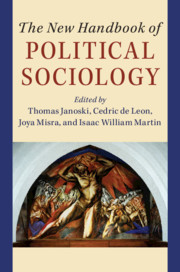Book contents
- The New Handbook of Political Sociology
- The New Handbook of Political Sociology
- Copyright page
- Dedication
- Contents
- Tables
- Figures
- Contributors
- Acknowledgments
- Introduction
- I Theories of Political Sociology
- II Media Explosion, Knowledge as Power, and Demographic Reversals
- III The State and Its Political Organizations
- IV Civil Society: The Roots and Processes of Political Action
- 22 The Challenges of Citizenship in Civil Society
- 23 Social Movements
- 24 Political Parties
- 25 Machine Politics and Clientelism
- 26 The Good, the Bland, and the Ugly
- 27 The Politics of Economic Crisis
- 28 The Influence of Public Opinion and Advocacy on Public Policy
- 29 Nationalism
- V Established and New State Policies and Innovations
- VI Globalization and New and Bigger Sources of Power and Resistance
- Index
- References
22 - The Challenges of Citizenship in Civil Society
from IV - Civil Society: The Roots and Processes of Political Action
Published online by Cambridge University Press: 22 February 2020
- The New Handbook of Political Sociology
- The New Handbook of Political Sociology
- Copyright page
- Dedication
- Contents
- Tables
- Figures
- Contributors
- Acknowledgments
- Introduction
- I Theories of Political Sociology
- II Media Explosion, Knowledge as Power, and Demographic Reversals
- III The State and Its Political Organizations
- IV Civil Society: The Roots and Processes of Political Action
- 22 The Challenges of Citizenship in Civil Society
- 23 Social Movements
- 24 Political Parties
- 25 Machine Politics and Clientelism
- 26 The Good, the Bland, and the Ugly
- 27 The Politics of Economic Crisis
- 28 The Influence of Public Opinion and Advocacy on Public Policy
- 29 Nationalism
- V Established and New State Policies and Innovations
- VI Globalization and New and Bigger Sources of Power and Resistance
- Index
- References
Summary
Citizenship theory in the social sciences has a rich history with Karl Marx (1978: 40, 179) and Max Weber (1981), but since the new millennium, it has greatly expanded in its conceptual breadth and use. The new century ushered in a deluge of fresh research that has deployed “citizenship” to conceptualize all kinds of social movements and political theoretical works that incorporate multiculturalism. The term now appears to be “omnirelevant” with “almost universal appeal,” thus becoming a “universal feature of the modern state” (Jensen 2001: 23; Isin 2015: 263; Cohen 2009: 13). Evelyn Nakano Glenn made it the president’s theme for the American Sociological Association convention in 2010 (2011). Nearly any movement seeking to promote equality for gender, racial, or ethnic groups now uses a citizenship framework to advance their work.
- Type
- Chapter
- Information
- The New Handbook of Political Sociology , pp. 595 - 626Publisher: Cambridge University PressPrint publication year: 2020
References
- 2
- Cited by

